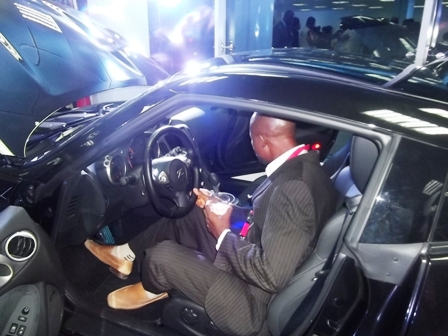Despite the nation’s freedom of information law, certain Nigerian automobile dealers still withhold vital information about their products. Some romance with few “journal-leases”, and shut their doors against selected others.
Releasing new cars to journalist for test-drive, a standard practice around the world, including South Africa, is what certain dealers frown at. Some do organize guided road tests. At the end, even when the car tested is only as safe as a man having sex with chainsaw, they have friend-of-the-house, journal-lease who would assist them to report: “it is the most secured world a motorist could be.”
While certain dealers, at least issue press releases and organize press briefings, I know a particular dealer, who avoid the media like plague. Neither would they grant interviews. And when you call them to confirm stories and even go as far as writing letters seeking for an interview, they promise to get back to you. They never will.
No doubt there are serious ones, who do not joke with media relations, guiding reputation of their brand jealously, by relating to journalists outside the box. Day or night, they reply your calls or text messages and in thorough obedience to the FOI law, they are ever generous with information.
The truth is that assemblers, auto dealers, motoring journalists and all those who have anything to do with the auto industry are all stakeholders. Success of the auto industry is in the interest of us all. Auto dealers need to stop seeing journalists as threats or those who must always be paid to do their job. And as time goes on, relevant government agencies should turn searchlight on the media profession and start sanctioning media people, practising blackmailing journalism for personal gains.
Credible media is vital to the success of multi-billions naira investments already and still being injected into the nation’s automobile sector. What the industry does not need are rogues, who terrorize investors with the title of media houses they work for. And investors too should be determined to do what is right, be generous with information. They should realize, for instance, that Motoring journalism without test-drive is like investigative journalism, always done behind the desk – mere fictitious writings. Credible automobile manufacturers and marketers worldwide know that test-drive is a strong public relations tool vital to the success of their products. Media test-drives buoy confidence about cars sold. It will be wrong to assume that many Nigerians do not read foreign motoring journals. They do. Many also visit standard auto shows in London, Frankfurt, New York, Paris, etc. They can differentiate between standard motor shows and car park exhibitions or mechanic training workshops referred to as motor shows in Nigeria. Journalists help auto marketers to discover what buyers would have found out later, and for a car assembled in Nigeria, amends can be made before being sold.
Of course it is unprofessional for a test-driver to deliberately condemn a car tested. Also, at the nation’s level of development, motoring journalists need to do their job with some element of patriotism akin to that of British motoring journalists reporting Jaguar-Landrover. His or her job is to educate prospective buyers about the strength and weakness of a new car and at the end give a verdict on whether or not it is safe to drive and also if it is worth the price tag on it. Test-drive exercise also challenges lazy or tyro motoring journalists to buckle-up.
Truth is that many Nigerians still have an impression than cars assembled in Nigeria are inferior to imported ones, which is not necessarily true. Such inkling is best erased via test-drive reports to compliment polished press releases. When prospective buyers read features stories with pictures or even video of proper test-drive exercise, they understand the machines better and can make an informed decision, when buying next personal or company car(s). A professionally knitted features article is what should emanate from a test-drive exercise. While readers desire information about styling, safety, equipment, power, comfort and space, power and economy, they are more pleased reading reports of how it feels riding and handling a car. It is during ride and handling that manoeuvrability, breaking and suspension are tested.
Comments from test-drivers are among crucial information that automakers take into cognizance when putting together subsequent models.
Unfortunately, over the years, certain Nigeria-based auto franchise dealers have developed “begger” impression about Nigerian journalists generally, which, giving the poor media management in the country, is understandable. My memory is still fresh about a sub-standard saloon car imported to Nigeria 2001. Although uninvited, I gate-crashed and participated in a usually guided test-drive. Obviously, as soon as I turned up the venue, atmosphere changed. It was as if an allied spy arrived at a Hitler’s camp. Anyway, upon test-driving the car on the third mainland bridge, its brake felt spongy and the suspension was not clever. I got back to the management about my finding, which they described as an isolated case, but won’t give me another car for re-test. I did a balanced test-drive report, which the company’s management was not pleased about. I was hounded on phone. After over a decade of that dramatic experience, I met an ex-management staff of the company at an occasion recently. Jokingly, his first statement was: “Ah! my enemy!!”
The truth is that professional motoring journalism is very vital to any credible automobile industry and is badly needed even now that the nation is on its journey towards full automobile manufacturing. It will attract credibility to locally assembled automobiles. More than that, it opportune professional journalists to work hand-in-hand with local assemblers and sell “made-in-Nigeria” to Nigerians. If our locally assembled automobiles follow tropicalization principle, they should be better for Nigerians than untropicalized, fully built up(FBU) cars being dumped on Nigerians, just like the one I test-drove 2001.
Our auto industry is on the match again. Motoring journalists should be given the chance to do their job. The industry needs them to mirror the truth to the nation’s motoring public- truth that locally assembled cars are likely to be better than imported ones. It takes the media to get Nigerians to internalize the attitude of falling in love with OUR OWN, and eschew their taste for killer Tokunbo cars, which might have been recalled in their country of origin for safety issues. The industry needs the media to consistently enlighten Nigerians that it is safer to buy locally assembled automobiles, because their makers are traceable. But motoring media reports will sound more credible when preceded or spiced with test-drive experience.
Therefore, releasing cars to motoring journalists for test-drive or being generous with vital information does not hurt. It is rather an indication that auto assemblers, importers and dealers are being honest with Nigerians.






